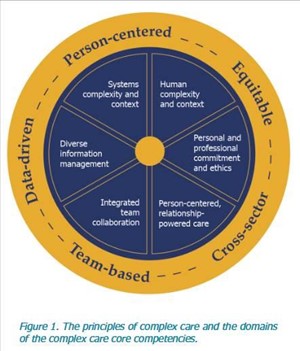 By Carrie Dorn, MPA, LMSW
and Rebecca Koppel, MSW, MPH
By Carrie Dorn, MPA, LMSW
and Rebecca Koppel, MSW, MPH
NASW is proud to endorse the Core Competencies for Frontline Complex Care Providers created by the National Center for Complex Health & Social Needs.
The Competencies were developed by a working group of diverse members with expertise in providing complex care, including social workers, community health workers, health care administrators, and consumers. These competencies describe the knowledge, skills, and attitudes required to provide quality care for people with complex health and social needs. The Competencies are foundational and set high standards for all providers in care teams regardless of discipline, profession, or sector. They reflect a holistic approach to health care services and create clear practice expectations for interdisciplinary teams.
Social workers and allied professionals serve individuals with multiple medical, mental health, and social needs across the continuum of care from health care facilities to social service agencies. Complex care is an emerging field of practice in which social workers have particular expertise. In the Blueprint for Complex Care, complex care is defined as “[a] person-centered approach to address the needs of people who experience combinations of medical, behavioral health, and social challenges that result in extreme patterns of healthcare utilization and cost.”
 The constellation of complex needs is unique from individual to individual. Sara Reid describes the positive impact of a complex care approach by sharing her story of challenges and successes as a woman of transgender experience. Sara struggled with financial debt, homelessness, mental health issues and family disconnection until she was able to find support and stability through the Transgender Health Program at Boston Healthcare for the Homeless. Today Sara is an advocate, a support group facilitator, and a health educator who trains providers on gender-affirming health care practices. In California’s Central Valley, Loretta’s experience included difficulty controlling her diabetes and receiving treatment for a substance use disorder, which led to a cycle of visits to hospital emergency rooms, homeless shelters, and jail. The support of a team at Adventist Health Hanford changed that pattern, and complex care providers helped Loretta to access stable housing, regular outpatient medical and behavioral health services, and reconnect with her children.
The constellation of complex needs is unique from individual to individual. Sara Reid describes the positive impact of a complex care approach by sharing her story of challenges and successes as a woman of transgender experience. Sara struggled with financial debt, homelessness, mental health issues and family disconnection until she was able to find support and stability through the Transgender Health Program at Boston Healthcare for the Homeless. Today Sara is an advocate, a support group facilitator, and a health educator who trains providers on gender-affirming health care practices. In California’s Central Valley, Loretta’s experience included difficulty controlling her diabetes and receiving treatment for a substance use disorder, which led to a cycle of visits to hospital emergency rooms, homeless shelters, and jail. The support of a team at Adventist Health Hanford changed that pattern, and complex care providers helped Loretta to access stable housing, regular outpatient medical and behavioral health services, and reconnect with her children.
Complex care has five overarching principles – person-centered, equitable, team-based, cross-sector, and data driven – that are listed in the outside ring of the figure (Figure 1). The competencies are organized into six domains, which are depicted on the inside of the ring. The six domains are human complexity and context; personal and professional commitment and ethics; person-centered, relationship-powered care, integrated team collaboration, diverse information management, and systems complexity and context. The principles and domains complement NASW’s Code of Ethics and standards, including NASW’s Standards in Social Practice in Health Care Settings.
The complex care core competencies prioritize a strengths-based, person-centered approach to care, an emphasis on cultural competence and social diversity, and an understanding of the impact of the social determinants of health on each individual. Adopting social work’s person-in-environment perspective, complex care practitioners support individuals to navigate fragmented systems of care between health institutions and community-based organizations.
The Competencies build on social work standards that can be applied by the range of practitioners involved in complex care. Many values that are central to social work overlap with complex care, including a commitment to service and social justice, as well as self-reflection and continuing education. In addition, the Competencies integrate concepts and terms that are relevant to care in today’s health care environment such as cultural humility, health disparities, anti-racism, moral injury, trauma-informed care, integrated care, resilience, and other concepts that have been elevated in social work practice.
The Competencies help interdisciplinary team members to unite behind shared goals and approaches to care. Social workers can look to the Competencies as a resource to enhance communication and collaboration on care teams, mediate differences in approaches between disciplines, engage in quality improvement initiatives, and advocate on behalf of patients. Social workers in supervisory roles can use the Competencies with staff and students as a learning framework that aligns with practice experiences. The Competencies can be an educational tool for BSW and MSW students in field placements to learn more about the specific skills that are important in complex care service delivery.
For organizations and programs, the Competencies can orient staff to the work of complex care and help determine training needs to enhance staff skills in delivering such care. The field of complex care is a natural fit for the values and skills of social workers, and it presents leadership opportunities, as social workers specialize in providing social care in the context of health settings. As complex care practice continues to grow and be defined, social workers will contribute to advance this field through direct practice, organizational leadership, and engagement in advocacy.
In the year ahead, the National Center will be building out tools and resources to help organizations and teaching institutions implement the competencies. To learn more, receive updates, and share the ways in which your organization is using the core competencies, click here.
Carrie Dorn, MPA, LMSW, is a senior practice associate at NASW.
Rebecca Koppel, MSW, MPH, is program manager, field building & resources for the Camden Coalition of Healthcare Providers National Center for Complex Health and Social Needs.
[divider]The 2021 NASW National Virtual Conference in June will also feature a breakout session on the Competencies, “Drawing from and advancing social work practice within interprofessional teams serving individuals with complex health and social needs.” See the agenda and learn more about conference registration.



